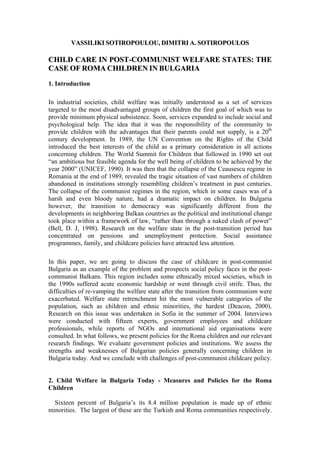
VSOTIROPOULOU article extract
- 1. VVAASSSSIILLIIKKII SSOOTTIIRROOPPOOUULLOOUU,, DDIIMMIITTRRII AA.. SSOOTTIIRROOPPOOUULLOOSS CCHHIILLDD CCAARREE IINN PPOOSSTT--CCOOMMMMUUNNIISSTT WWEELLFFAARREE SSTTAATTEESS:: TTHHEE CCAASSEE OOFF RROOMMAA CCHHIILLDDRREENN IINN BBUULLGGAARRIIAA 1. Introduction In industrial societies, child welfare was initially understood as a set of services targeted to the most disadvantaged groups of children the first goal of which was to provide minimum physical subsistence. Soon, services expanded to include social and psychological help. The idea that it was the responsibility of the community to provide children with the advantages that their parents could not supply, is a 20th century development. In 1989, the UN Convention on the Rights of the Child introduced the best interests of the child as a primary consideration in all actions concerning children. The World Summit for Children that followed in 1990 set out “an ambitious but feasible agenda for the well being of children to be achieved by the year 2000” (UNICEF, 1990). It was then that the collapse of the Ceausescu regime in Romania at the end of 1989, revealed the tragic situation of vast numbers of children abandoned in institutions strongly resembling children’s treatment in past centuries. The collapse of the communist regimes in the region, which in some cases was of a harsh and even bloody nature, had a dramatic impact on children. In Bulgaria however, the transition to democracy was significantly different from the developments in neighboring Balkan countries as the political and institutional change took place within a framework of law, “rather than through a naked clash of power” (Bell, D. J, 1998). Research on the welfare state in the post-transition period has concentrated on pensions and unemployment protection. Social assistance programmes, family, and childcare policies have attracted less attention. In this paper, we are going to discuss the case of childcare in post-communist Bulgaria as an example of the problem and prospects social policy faces in the post- communist Balkans. This region includes some ethnically mixed societies, which in the 1990s suffered acute economic hardship or went through civil strife. Thus, the difficulties of re-vamping the welfare state after the transition from communism were exacerbated. Welfare state retrenchment hit the most vulnerable categories of the population, such as children and ethnic minorities, the hardest (Deacon, 2000). Research on this issue was undertaken in Sofia in the summer of 2004. Interviews were conducted with fifteen experts, government employees and childcare professionals, while reports of NGOs and international aid organisations were consulted. In what follows, we present policies for the Roma children and our relevant research findings. We evaluate government policies and institutions. We assess the strengths and weaknesses of Bulgarian policies generally concerning children in Bulgaria today. And we conclude with challenges of post-communist childcare policy. 2. Child Welfare in Bulgaria Today - Measures and Policies for the Roma Children Sixteen percent of Bulgaria’s its 8.4 million population is made up of ethnic minorities. The largest of these are the Turkish and Roma communities respectively.
- 2. Children constitute a quarter of the total population. Bulgaria’s falling birth rate is reported to be the lowest in Europe (UNDP, 1997). Like other post-communist countries in the region, Bulgaria is undergoing a period of transition marked by economic, fiscal and institutional reform. The reform process has led to growing poverty and inequality in the country (Stubbs, 2001; Kornai, 1997). Women, the elderly and the minority population are the worst affected. Children are in increasing risk of abandonment and placement in care. There are no effective measures available to support families who are at risk of family breakdown. The onus of public care is on institutions. The whole residential care system is in drastic need of reform (European Commission, 2004; Save the Children, 2002). Its current structure and functioning makes it unable to meet the most basic of children’s human rights. The two underlying issues facing children in Bulgaria today are: The social and economic impact of transition on children and their families; Inadequate legislation to protect children and an absence of adequate child protection procedures and regulations governing the whole system of childcare. After its election to power in April 1997, the government under the United Democratic Forces has adhered to a stringent economic and fiscal framework in order to ensure that World Bank and International Monetary Fund reform and structural adjustment requirements are met. The situation did not really change when the “National Movement of King Symeon the Second” came to power through elections in 2000 Government policy is very much focused on standardization of existing legislation and meeting EU accession criteria, with a marked decline in service delivery and poverty alleviation. Children and issues concerning young people are not given priority and rarely feature in public debate. Bulgaria has one of the highest poverty rates in Central and Eastern Europe comparable only to Romania (USAID, 1998-2002). According to the World Bank, in 1995, 43% of Bulgarian children were living in poverty and indications are that poverty levels have since risen. Unemployment is currently at 14% of the active population. Privatisation and closures of loss-making state enterprises have resulted to an increase of this number. The Roma minority, women and young people are the worst affected. In some areas, unemployment amongst the Roma is as high as 90%. Long-term unemployment is the highest in CEE, affecting 10% of the Bulgarian labour force (UNDP, 1997). The above situation has sharpened ethnic disparity and racism fuelled by a nationalist revival. Consequently, the ethnic issue is a factor cross-cutting all the issues facing children.